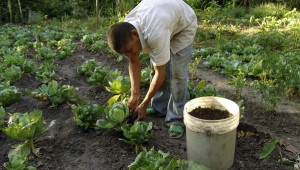Sunday Times 2
Thinking beyond organics for safe food and water
The growing popularity of organic food among South Asia’s middle class is an encouraging sign.
As the next logical step, those advocating healthier eating, sustainablefarming and small farmers’ welfare must come together. Their causes are both overlapping and interdependent.
In fact, organics are the more visible facet of a broader transformation needed in our food production and consumption. Current practices of growing food with high external inputs – such as chemical fertilisers and toxic pesticides – damage both human health and the environment.
Acknowledging this, scientists have been searching for alternatives. Many see eco-farming (also called agro-ecology) as the best way to reconcile the historical tension between farming and nature.

Image credit: Sean Sprague / Panos
By applying ecological concepts to agricultural systems, eco-farming enhances soil fertility and protects crops against pests through the smart use of natural elements such as friendly plants and insects. This holistic approach can produce comparable yields, while buffering against climate change and generating incomes for farmers.
These benefits were highlighted in a synthesis report preparedin 2011 by the United Nations Human Rights Council’s special rapporteur on the right to food. It called for a fundamental shift towards ecological agriculture as a way to boost food production and improve livelihoods.
Based on an extensive survey of scientific literature, Olivier De Schutter, the special rapporteur, argued that small-scale ecological agriculture – if properly supported – can double food production within 10 years.
However, certain enabling factors are needed for this paradigm shift.
Organics in South Asia
Organics are marching forward. The Research Institute of Organic Agriculture (FiBL), which tracks global trends, says organic farming is now practised in 164 countries where 1.9 million farmers manage some 37.5 million hectares of land organically. The extent of land has more than trebled from 11 million hectares in 1999.
Until recently, the organic movement in Asia has been fuelled mostly by demand from western markets. In 2012, global sales of organic food and beverages reached nearly US $64 billion. The United States and European Union account for much of this.
Asian countries like China, India, Indonesia and Sri Lanka still have highly export-oriented organic sectors, but FiBL says that trend is changing. “The rising middle class and growing consumer awareness of organic production methods are, however, developing internal markets for organic foods”.
Beyond organics
Ideally, organic farming policies and regulations in South Asia should be driven by domestic considerations, and not simply to satisfy overseas buyers. At the same time, going organic means much more than just eating safer food.
Advocacy groups can leverage the new purchasing power of Asian middle classes to demand not only authentic organic food but also broader reforms in land and water management.
Across South Asia, there is rampant use of agrochemicals to grow food and cash crops. No one – not even the most consistent eater of organic foods – is fully shielded from exposure through sources like water, milk products or tea.
Consumer activists are frustrated by inadequate safety standards for maximum residue levels (MRLs) for pesticides. In Sri Lanka, for example, more than three decades have passed since passing the Control of Pesticides Act, but no MRLs have been defined.
The organic movement cannot succeed in isolation. It needs to be part of a broader alliance that nudges markets in the public interest.
(Courtesy SciDev.net)

